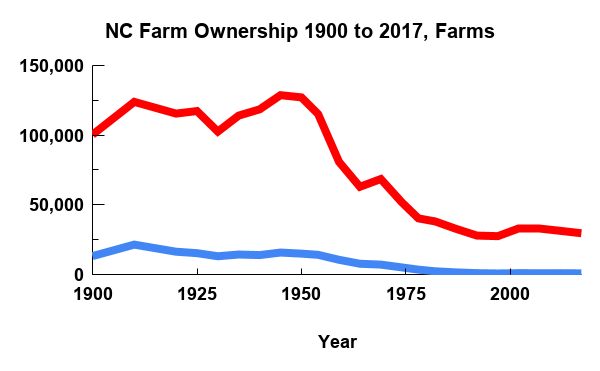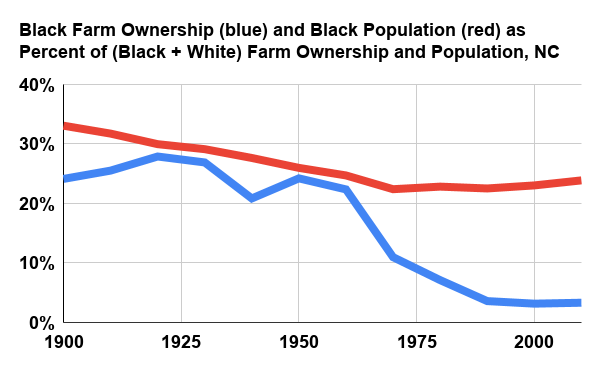Equity Issues and NC Farmland Ownership
go.ncsu.edu/readext?698752
en Español / em Português
El inglés es el idioma de control de esta página. En la medida en que haya algún conflicto entre la traducción al inglés y la traducción, el inglés prevalece.
Al hacer clic en el enlace de traducción se activa un servicio de traducción gratuito para convertir la página al español. Al igual que con cualquier traducción por Internet, la conversión no es sensible al contexto y puede que no traduzca el texto en su significado original. NC State Extension no garantiza la exactitud del texto traducido. Por favor, tenga en cuenta que algunas aplicaciones y/o servicios pueden no funcionar como se espera cuando se traducen.
Português
Inglês é o idioma de controle desta página. Na medida que haja algum conflito entre o texto original em Inglês e a tradução, o Inglês prevalece.
Ao clicar no link de tradução, um serviço gratuito de tradução será ativado para converter a página para o Português. Como em qualquer tradução pela internet, a conversão não é sensivel ao contexto e pode não ocorrer a tradução para o significado orginal. O serviço de Extensão da Carolina do Norte (NC State Extension) não garante a exatidão do texto traduzido. Por favor, observe que algumas funções ou serviços podem não funcionar como esperado após a tradução.
English
English is the controlling language of this page. To the extent there is any conflict between the English text and the translation, English controls.
Clicking on the translation link activates a free translation service to convert the page to Spanish. As with any Internet translation, the conversion is not context-sensitive and may not translate the text to its original meaning. NC State Extension does not guarantee the accuracy of the translated text. Please note that some applications and/or services may not function as expected when translated.
Collapse ▲We believe that educating ourselves on the issue of race in the context of farmland ownership is one way we can take action on NC State Chancellor Woodson’s request that the university community “eliminate racism and all other forms of discrimination” by embracing “with humility that we all have more to learn as it relates to understanding our own places of prejudice and how we can strive to overcome how these impact our own actions.”
Below are a few charts based on historical agricultural census and general population data. This first chart represents the number of farms owned by Black and African Americans (blue line) versus the total number of farms in NC (red line). The earliest data available is for the year 1900.

As the chart above indicates, Black farm ownership actually peaked in the early 1900s. Since then there has been a steady decline in Black farm ownership, due to a combination of many factors, including Jim Crow policies and a lack of access to affordable legal assistance for estate planning. Many farms were passed down without wills, which set up heirs property situations, making farms vulnerable to forced partition sales. Other farms were intentionally sold as many African Americans moved to urban areas after World War II to find better employment. As the chart below indicates, the current percentage of the African Americans who own farm is at its lowest point since the Civil War.

For more information on Equity and Farm Ownership in North Carolina, consider these resources at UNC, the Southern Rural Development Center, the Heirs Property Retention Center, and the Land Loss Prevention Project.


